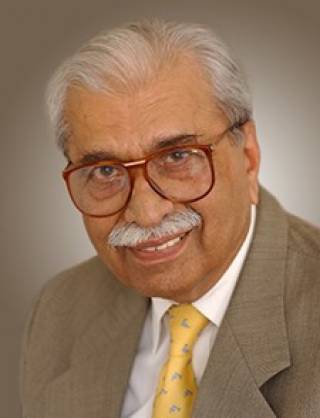Born 20th January 20, 1925 - Deceased 10th April 10, 2016
Wadia was universally regarded as the “founder of contemporary Indian neurology.”

Wadia was emeritus director of the department of neurology, Jaslok Hospital & Research Centre and consultant for life at Grant Medical College and Sir JJ Group of Hospitals — a unique honour bestowed on him upon his retirement. He became deeply involved with the World Federation of Neurology (WFN) from its inception in 1957. He was invited to be a founding member of the first Commission of Tropical Neurology in 1961 at Buenos Aires, Argentina. His interest in this field continued, and he became secretary and later chairman of the tropical neurology research group. He also took an active interest in the ataxia research group, which he chaired for more than a decade until 2001. He has served as either chair or member of the education, steering, long range planning, membership, and nomination committees. He served as vice president between 1989 and 1993. In recognition of his outstanding contributions to the WFN, he was awarded the first WFN Gold Medal for services to international neurology in 2009 during the World Congress of Neurology in Bangkok.
His early and pre-medical education was at St. Xavier’s School and College in Bombay. He always wanted to be a doctor and joined Grant Medical College and Sir JJ Group of Hospitals in 1943. He subsequently went to England and successfully obtained MRCP (London) at the first attempt in March 1952. Between 1952 and 1956, Wadia pursued his neurology training initially with G.F. Rowbotham in the neurosurgery department, Newcastle General Hospital, and subsequently under legendary neurologist Sir Russell Brain at London’s Maida Vale Hospital. In 1954, Brain appointed him a registrar at the London hospital — the first Asian to be appointed as registrar.
Wadia returned to Bombay in 1957 and joined his alma mater as an honorary consultant neurologist. Between 1957 and 1961, he established the department of neurology there, in spite of being inundated with work, with a paucity of funds and equipment, and in the days when a licence was required to obtain any medical equipment. This department grew and had a formidable reputation by the time he retired in 1982. In 1973, while still at the Sir JJ Group of Hospitals, he established another neurology department at the Jaslok Hospital and Research Centre, a private trust hospital, and helped the department gain recognition for postgraduate training.
During his tenure at Sir J.J. Group of Hospitals, Wadia noticed that the prevalence of neurological diseases was different from what he had seen during his training in England. An astute clinician, he diagnosed manganese poisoning in miners, myelopathy associated with congenital atlantoaxial dislocation, tuberculous spinal meningitis, and Wilson’s disease. His seminal contribution was in identifying an autosomal dominant cerebellar ataxia with slow eye movements and documented the degeneration of neurons in the parapontine reticular formation (PPRF) in collaboration with colleagues from Germany. This exemplary work was spread over several decades through sheer dint of hard work and perseverance. His other seminal contribution was the identification of a new polio-like illness following acute hemorrhagic conjunctivitis in 1971, later designated as EV70 disease. His work was published in high-impact international journals, and his book, Neurological Practice — An Indian Perspective, was published in 2005 with a second edition in 2014.
He was the the recipient of many awards. Among these, the fellowship of the Indian National Science Academy (INSA), which is rarely awarded to a clinician, and the SS Bhatnagar INSA Medal for Excellence in General Science. He was also committed to the functioning of Sree Chitra Tirunal Institute of Medical Sciences and Technology, Trivandrum, Kerala, and was appointed as president and chancellor of the Institute from 1995-2002 by the government of India. He believed in neurological social responsibility, and was a trustee or founding member of several societies for the welfare of patients with neurological disorders. On January 26, 2012, the government of India conferred the Padma Bhushan Award to him in recognition of his services to neurology.
He inspired several generations of neurologists now practicing in India and abroad.
 Close
Close

